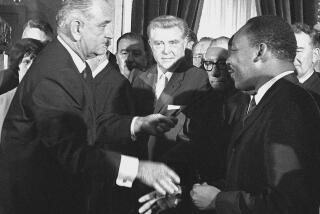Perilous Erosion of Miranda
- Share via
It is now such standard fare on television police shows that it’s easy to forget its real-world origins: “You have the right to remain silent. . . . “
The Miranda warning is not just a pro forma protection for obviously guilty people who are arrested. It is also an important protection--put in place by a Supreme Court decision more than 30 years ago--for those who are wrongly accused. Before that hallmark decision, back-room confessions could be extracted under harsh squad-room lights by police officers who felt free to use force to help the process along. Suspects could be deprived of sleep and often of an attorney (if they knew to ask for one), isolated from family and threatened with physical harm. Too often the result was a confession without truth.
With its 1966 Miranda ruling, the U.S. Supreme Court intended to put an end to these practices. Unchecked, such coercion and intimidation make a mockery of constitutional guarantees of a fair trial. The high court required police to immediately warn suspects that they have a right not to incriminate themselves, that a lawyer will represent them and that the government can use in a trial any statement a suspect makes.
But the now-classic Miranda warning is at risk of being better enforced in television dramas than in police work. A sorry federal appeals court decision Tuesday from Virginia could accelerate that trend.
Miranda has never been absolute; three years after that decision the Supreme Court created a limited “public safety” exception, allowing an officer, for example, to first ask a suspect the whereabouts of his gun and then advise him of his rights. In 1968 Congress attempted to define when a confession can be considered voluntary and is thus admissible. More recently, a string of state and federal court decisions has begun to shred the original ruling. Last year, the California Supreme Court allowed police officers to continue questioning a suspect who had asked for a lawyer after a Miranda warning; the ruling permitted statements gathered this way to impeach the suspect in court.
Tuesday’s ruling is even more dangerous. Interpreting the 1968 federal statute on voluntary confessions, a three-judge panel allowed in court a confession from a suspect before he had been read his rights. Although Atty. Gen. Janet Reno has called that law unconstitutional and the Justice Department has declined to rely on it, the appeals court said the 1968 statute now takes precedence over Miranda. The court groused that failure to invoke this law has produced too many acquittals and “the nonprosecution of many dangerous felons.” “There is no excuse for this,” the court wrote--apparently not even the Constitution.
The decision is likely to be appealed to the full circuit and then to the Supreme Court, and for now it binds only five southeastern states. Still, it should not stand.
More to Read
Sign up for Essential California
The most important California stories and recommendations in your inbox every morning.
You may occasionally receive promotional content from the Los Angeles Times.













